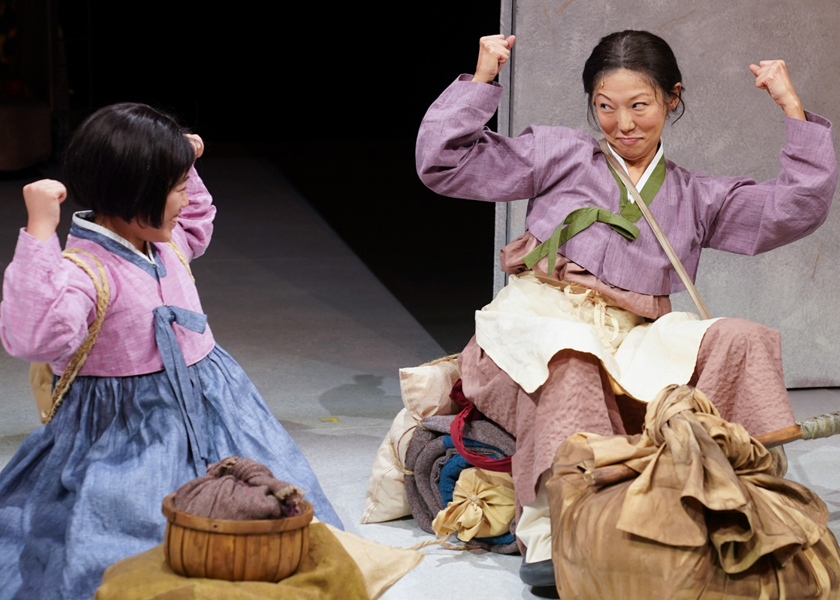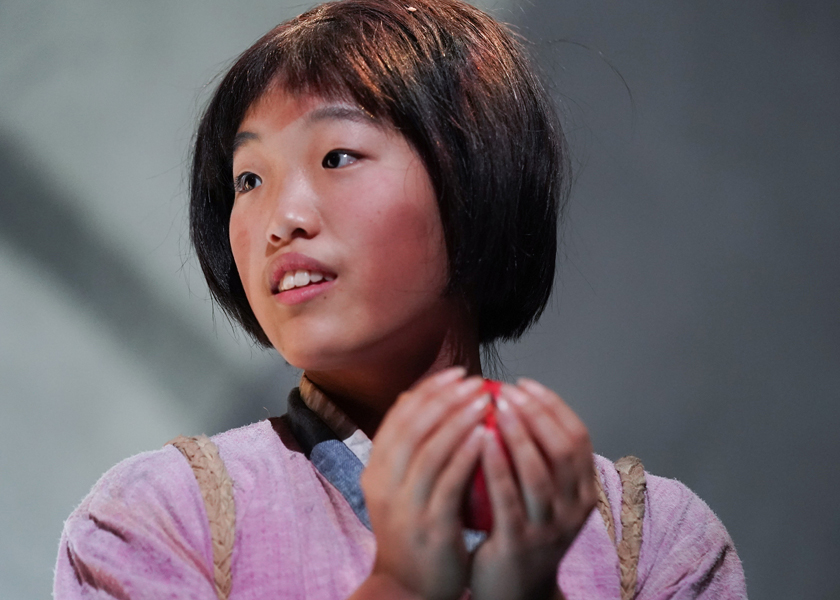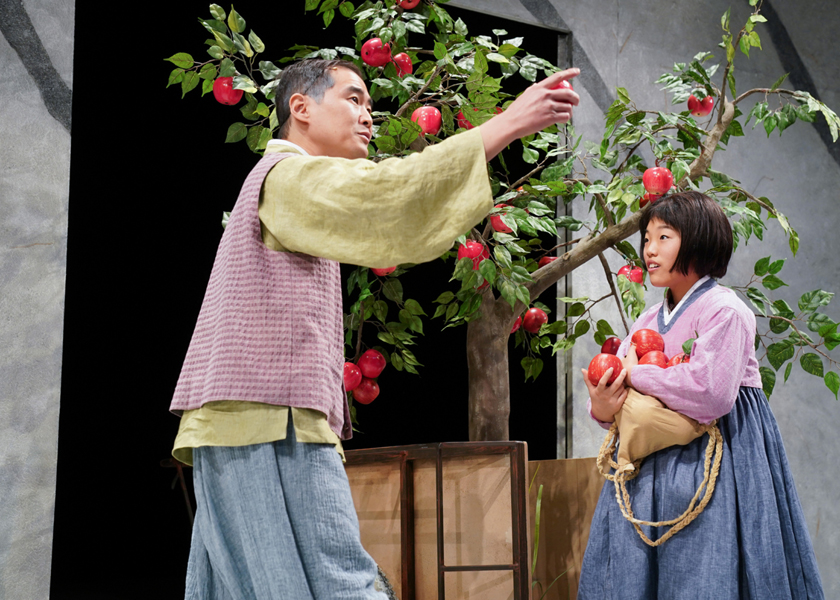A play about the tragedy of war for kids and adults | Review by Joanne Rhim Lee (Winter 2022 issue)

Bina’s Six Apples by Lloyd Suh
(Directed by Eric Ting, Children’s Theatre, Minneapolis ~ January 9 – February 13, 2022)
In Lloyd Suh’s new work Bina’s Six Apples, premiering at the Children’s Theatre in Minneapolis, the title character is a 10-year-old girl who lives with her family in a peaceful apple orchard in Geochang, South Korea. As the youngest child, she seems to spend an inordinate amount of time daydreaming under an apple tree, often being excused from the more taxing chores of her older siblings.
But along with everyone in Korea, Bina’s life is changed forever on June 25, 1950. Her father wakes her from her reverie and urges her to get ready for their long journey on foot to Busan; a city on the southeastern tip of Korea. Like a typical child, she is confused and resistant to leaving her beloved home, complaining that she doesn’t like Busan, the ocean, or war itself.
Rather than snap at his daughter, her father gently commiserates with her, saying that he doesn’t like war either. Regardless, he urges her to make herself useful, instructing her to pack her little backpack with some apples from the orchard for their three-day journey.
Bina’s face brightens at the prospect of having an important role, and goes about carefully choosing six bright red, juicy apples in her tiny backpack, one for each member of her family. She imagines that when they arrive in Busan, they will all celebrate with her specially-chosen apples.
War it is a difficult subject for a children’s play, but Suh manages to write on two levels: one for adults who understand the deep tragedy of the Korean War and the grief that resulted from millions of deaths and family separations; and another for kids who will react with wide-eyed surprise to the physical and moral challenges that Bina faces. The play is a heartwarming one both for these groups. Bina makes wise choices and touches many lives; both adults and children can perceive this in the play’s thoughtful delivery.
Kudos to Suh and director Eric Ting for not glossing over the violence of the war. In fact, perhaps Bina’s Six Apples should come with a trigger warning, as an early scene includes the sound of deafening bombs which go on for quite some time. In the ensuing chaos, Bina is separated from the rest of her family, alone in a dangerous war zone. She fends for herself from then on, while trying to make her way south to Busan without a compass or a map.
The prospect of such a challenge would make most adults want to curl into a ball and give up, but Bina keeps moving no matter what. Along the way, she encounters a number of colorful individuals, including a soldier, a merchant, and a fishing boat captain. Each of them is also alone in their own way, trying to find their way home just like she is.
In addition to being lost, Bina is also hungry, and has no money. However, she has one very valuable commodity: Her six apples. She is determined not to eat or trade them, because she is saving them for what she knows will be a joyful reunion with her family in Busan. But strangers continue to inquire about the curious lumps in her backpack.

In her Children’s Theatre debut, Olivia Lampert plays Bina with innocent joy, wonder, and grit. Immediately after being separated from her family, her movements and voice are a bit shaky and frightened, but they slowly become steadier and more determined. The rest of the cast does an excellent job of showing the depth of a family’s love, as well as the quiet strength of the individuals displaced by the war.
In particular, Twin Cities theater veteran Sun Mee Chomet shines in her dual roles as Bina’s mother and a merchant who encounters Bina on her way south, as does Joseph Pendergrast as Bina’s older brother and a soldier who lends her a hand.
For many years, playwright Lloyd Suh had been holding onto a story his father told of a memory about his family during the Korean War. When the war broke out in 1950, his father was age five, but remembered all his life how his family was forced to flee south to Busan during the war, along with hundreds of thousands of other Koreans. His father carried a backpack of apples, and remembered feeling that it was a very important job.
When Suh’s previous work, The Wong Kids in the Secret of the Space Chupacabra, Go! premiered at the Children’s Theatre several years ago, the playwright told his story to one of the directors at Children’s Theatre, who suggested to Suh that it would be a good starting point for his next play.
Though the Twin Cities has a relatively small Korean American population compared to other large cities in the U.S., it has become home to thousands of refugees from around the world during the past few decades, so the topic of internally displaced and stateless people is a relatable one for many children and adults.
In the midst of theatre cancellations and continuing bad news because of the pandemic, Bina’s Six Apples is a beautiful piece of art, a welcome island of joy at a time when daily life is often a sea of uncertainty.



